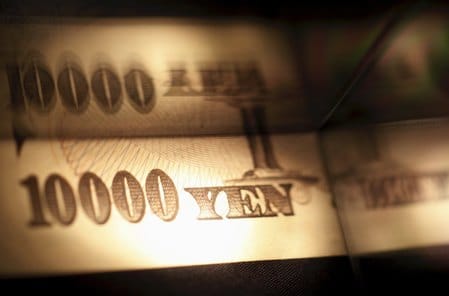Asia stocks bide time ahead of US data; Nikkei bruised by BOJ pivot bets

Source: Market Screener
SINGAPORE, March 14 (Reuters) - Asian shares held near seven-month highs on Thursday though traded mostly sideways as investors awaited fresh catalysts that would provide further clarity on the global interest rate easing cycle.
Japan's Nikkei snapped a three-day losing streak but was still on track for its steepest weekly decline in three months, as a potential policy pivot from the Bank of Japan (BOJ) at its meeting next week draws near.
MSCI's broadest index of Asia-Pacific shares outside Japan was last little changed and strayed not too far from a seven-month peak hit in the previous session, as traders shrugged off higher-than-expected U.S. inflation rate data.
S&P 500 futures rose 0.15% and Nasdaq futures gained 0.3%, while EUROSTOXX 50 futures fell 0.04%.
Attention now turns to U.S. producer price data due later in the day, which feeds into the core personal consumption expenditures (PCE) price index, as well as retail sales figures for February.
The core PCE index is the U.S. Federal Reserve's preferred measure of inflation.
Thursday's data run comes ahead of the Fed's policy meeting next week, where focus will be on clues as to how soon policymakers could commence their rate-easing cycle.
"Since the FOMC (Federal Open Market Committee) last met, the U.S. inflation data have come in a bit stronger than expected, while the labour market generally has remained resilient," said economists at Wells Fargo in a client note.
"With payroll growth still solid and inflation proving to be a bit stickier recently, we suspect the FOMC will still be seeking greater confidence at the end of its meeting next week that inflation is headed back to 2% on a durable basis."
Still, the dollar struggled to break away from its recent lows, as traders remained focused on the prospect of lower U.S. rates by the end of the year.
The euro hovered near a two-month high and last bought $1.0941, while sterling stood not too far from a seven-month top.
In China, the blue-chip CSI300 Index and Shanghai Composite Index both fell more than 0.6%. Hong Kong's Hang Seng Index slid 1%, dragged by technology stocks which lost nearly 2%.
The weakness came in part due to news that a Washington-based global trade association representing biotechnology companies is taking steps to "separate" from Chinese member Wuxi AppTec , which sent shares of the company tumbling.
In Japan, swirling speculation that the BOJ could end negative interest rates as soon as next week kept domestic yields supported.
Yields on Japanese government bonds (JGBs) rose to multi-week highs on Thursday, with the 10-year yield up 2.5 basis points at 0.78%.
The yen eased slightly to 147.92 per U.S. dollar, while the Nikkei closed up 0.3%, though was some distance away from a record high above the 40,000 level.
Investors have been increasingly pricing in the chance of a March policy shift, particularly after news of bumper pay rises from some of Japan's biggest names at this year's annual wage negotiations.
A preliminary survey on big firms' wage talks is due on Friday. BOJ policymakers have said the talks are key to determining the timing of the central bank's stimulus exit.
"I think an earlier decision to scrap NIRP (negative interest rate policy) in March will suggest that the BOJ's confidence in achieving its 2% inflation target is much stronger, so I think that could have some impact on market expectations for the pace of rate hikes beyond the first decision to scrap NIRP," said Yujiro Goto, head of FX strategy for Japan at Nomura.
"I think it's more important if the rate hike expectations into next year increase or not, after the decision to scrap NIRP. That's (potentially) more important on financial markets. A timing for a second rate hike could be more important for the JGB and yen market."
In commodities, Brent rose four cents to $84.07 a barrel, while U.S. crude was flat at $79.72 per barrel.
(Reporting by Rae Wee; Editing by Christopher Cushing)
